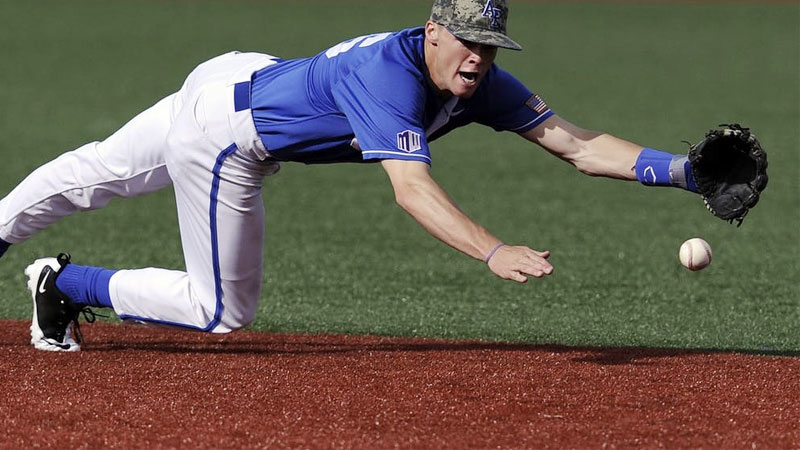Baseball is a game of statistics, where every pitch, hit, and fielding play is meticulously analyzed to assess a player’s performance and a team’s success.
One intriguing statistic that often perplexes both seasoned fans and newcomers is the concept of an “unearned run.” What is an unearned run in baseball?
In this blog post, we dive deep into the world of baseball to unravel the mystery behind unearned runs.
We’ll explore the definition, the role of errors, the historical perspective, and the statistical significance of unearned runs.
Whether you’re a die-hard baseball enthusiast or a beginner seeking to comprehend this essential aspect, this guide will provide insight into the often misunderstood concept of unearned runs in baseball. Stay sharp.
What Is an Unearned Run in Baseball?
In baseball, an unearned run is a run scored by a baserunner who reaches home plate due to errors or mistakes made by the defensive team.
These errors can include fielding errors, throwing errors, or passed balls by the pitcher or catcher.
Unearned runs are not charged against the pitcher’s earned run average (ERA) because they are considered a result of defensive lapses rather than the pitcher’s performance.
However, they still count towards the team’s total runs in the game. Unearned runs highlight the importance of solid defense in baseball, as they can impact the outcome of a game and the statistics of individual players.
To be considered an unearned run, it must be clear that the run would not have scored without the defensive error.
This distinction helps maintain fairness in evaluating a pitcher’s performance and a team’s overall defensive capabilities.
Earned Run Vs Unearned Run
It is essential to learn the basics of the earned vs unearned runs. Here are some aspects mentioned below.
Definition and Attribution
Earned Run: An earned run is a run scored by a baserunner as a direct result of the pitcher’s performance, such as hits, walks, or home runs.
Unearned Run: An unearned run is a run scored due to errors or mistakes made by the defensive team, which can include fielding errors, throwing errors, or passing balls.
Statistical Impact
Earned Run: Earned runs are counted towards a pitcher’s earned run average (ERA), which is a crucial statistic in evaluating a pitcher’s effectiveness.
Unearned Run: Unearned runs are not factored into a pitcher’s ERA, as they are attributed to defensive lapses rather than the pitcher’s ability.
Fairness and Accountability
Earned Run: Earned runs provide a fair assessment of a pitcher’s performance, focusing on their ability to prevent opposing players from reaching base and scoring.
Unearned Run: Unearned runs underscore the importance of strong defense, ensuring that a pitcher isn’t unfairly penalized for mistakes made by their teammates.
Game Impact
Earned Run: Earned runs have a direct impact on the outcome of a game and often reflect the quality of the opposing team’s offense and the pitcher’s ability to control the game.
Unearned Run: Unearned runs can also influence the outcome of a game, but they highlight the need for defensive improvement rather than evaluating the pitcher’s performance.
Clarity and Interpretation
Earned Run: Earned runs are easier to interpret, as they are primarily based on the actions of the pitcher and the opposing batters.
Unearned Run: Unearned runs may require a closer examination of the game’s play-by-play to determine the specific defensive errors that led to the runs.
How Unearned Runs Occur?

Unearned runs occur in baseball when a run is scored by a baserunner due to errors or mistakes made by the defensive team.
Here are the primary ways unearned runs can occur:
Fielding Errors
Fielding errors are among the most common causes of unearned runs. These errors occur when a fielder fails to cleanly field a batted ball, mishandles a ground ball, or drops a fly ball.
If a fielding error allows a baserunner to advance or reach base safely, any subsequent runs scored by that baserunner are considered unearned.
Throwing Errors
Throwing errors can also lead to unearned runs. This happens when a fielder makes an inaccurate or errant throw, which results in baserunners advancing.
For example, an overthrow to first base on a routine ground ball may allow a runner to reach base and eventually score, with the run being unearned.
Passed Balls or Wild Pitches
Unearned runs can occur if a pitcher throws a wild pitch or if a catcher fails to effectively handle a pitch, allowing baserunners to advance.
If a passed ball or wild pitch leads to a runner scoring, that run is typically deemed unearned because it is not attributed to the batter’s performance.
Interference and Other Defensive Miscues
Unearned runs can also result from various defensive miscues, including interference with a baserunner or other rare situations.
Defensive interference, such as obstructing a baserunner’s path, can lead to unearned runs if it results in a runner scoring.
Defensive Indifference
In some cases, unearned runs may occur due to what’s known as “defensive indifference.”
This happens when the defensive team allows a baserunner to advance without making an effort to stop them, usually in situations where the runner’s advancement doesn’t significantly affect the game’s outcome.
If a runner advances due to defensive indifference and subsequently scores, the run is considered unearned.
Unearned runs highlight the importance of sound defensive play and serve to distinguish between runs resulting from the pitcher’s performance and those resulting from fielding mistakes.
The Role of Errors in Unearned Runs

Errors play a central role in the occurrence of unearned runs in baseball, as they are a key factor that distinguishes earned and unearned runs.
Here are the primary aspects of how errors contribute to unearned runs:
Error Definition
An error in baseball is an official judgment made by the scorekeeper when a defensive player fails to make a play that a reasonably skilled fielder should have made under normal circumstances.
This can include mishandling a batted ball, dropping a catchable fly ball, making an inaccurate throw, or failing to tag a runner in a rundown.
Baserunners Advancing
When an error occurs, the primary consequence is that baserunners are allowed to advance or reach base safely when they would have been retired under typical fielding circumstances.
For example, if a shortstop mishandles a ground ball, the batter may reach base safely, or runners on base may advance an extra base.
Runs Scored as a Result
If a baserunner advances or reaches base due to an error and subsequently scores, any runs scored by that baserunner are considered unearned.
This means that the runs are not attributed to the performance of the pitcher and are not included in the pitcher’s earned run average (ERA).
Influence on Pitcher’s Performance
Errors can impact a pitcher’s performance statistics significantly.
If the defensive team commits multiple errors in an inning, it can lead to a high number of unearned runs, making a pitcher’s ERA less reflective of their true performance.
Emphasis on Defensive Skills
Errors emphasize the importance of strong defensive skills in baseball.
They highlight the need for fielders to make routine plays consistently, as failing to do so can lead to unearned runs, potentially affecting the outcome of a game.
Errors in baseball result from defensive lapses and directly contribute to unearned runs.
The Statistic Significance of Unearned Runs

The significance of unearned runs in baseball lies in their impact on player statistics, game outcomes, and the evaluation of team performance.
Here are the key points regarding the statistical significance of unearned runs:
Pitcher’s ERA (Earned Run Average)
Unearned runs play a significant role in the calculation of a pitcher’s ERA.
By excluding unearned runs from the calculation, the ERA provides a more accurate measure of a pitcher’s ability to prevent runs that are primarily a result of their performance.
This distinction is crucial for assessing a pitcher’s effectiveness.
Team Performance Evaluation
Unearned runs are a part of the total runs scored in a game. Therefore, they have a direct impact on team statistics.
While unearned runs do not reflect a pitcher’s performance, they contribute to the overall evaluation of a team’s offense and defense, showcasing the need for a well-rounded and strong team.
Game Outcomes
Unearned runs can influence the outcome of a game. A single error that leads to an unearned run can be the difference between a win and a loss.
Teams with strong defense and error-free play are more likely to win close games, highlighting the importance of minimizing defensive errors.
Fairness in Player Assessment
Unearned runs provide a level of fairness in evaluating players. Pitchers are not penalized for mistakes made by their fielders, and fielders are held accountable for their errors.
This separation of responsibility helps ensure that players are assessed based on their own performance and the roles they play on the team.
Historical and Comparative Analysis
When assessing players and teams across different eras or comparing performance over time, the distinction between earned and unearned runs is critical.
It allows for a more accurate historical analysis of player and team performance and helps put contemporary achievements into a broader context.
Unearned runs are statistically significant in baseball as they impact a pitcher’s ERA, team performance evaluation, game outcomes, and the fairness of player assessment.
Historical Perspective
A historical perspective on baseball’s treatment of unearned runs reveals how the concept has evolved and impacted the sport over the years:
Early Days and Scoring Rules
In the early history of baseball, scoring was relatively informal and often recorded in newspapers.
The concept of earned and unearned runs was not as well-defined as it is today.
Errors, however, were recognized and led to baserunners reaching base and scoring, as they do today.
Development of Official Scoring Rules
The distinction between earned and unearned runs became more formalized with the development of official scoring rules in the late 19th and early 20th centuries.
Scorekeepers were assigned the responsibility of determining whether runs were earned or unearned, based on fielding errors and other factors.
Statistical Significance
The introduction of earned run average (ERA) as a prominent pitching statistic in the early 20th century emphasized the importance of distinguishing between earned and unearned runs.
This change allowed for a more precise evaluation of a pitcher’s performance, contributing to the statistical significance of unearned runs.
Rule Changes and Modern Interpretation
Over time, baseball has seen rule changes and refinements related to the treatment of unearned runs.
The criteria for determining earned and unearned runs have evolved, but the core concept remains.
Modern scoring rules ensure that unearned runs are primarily attributed to defensive lapses rather than pitcher performance.
Historical Analysis
Unearned runs have played a pivotal role in historical analyses of player and team performance.
They allow researchers and enthusiasts to make fair comparisons across eras and assess the defensive and pitching capabilities of players from different time periods.
Historical statistics, including unearned runs, are a vital component of baseball’s rich and storied history.
The historical perspective of unearned runs in baseball demonstrates how the concept has developed from a relatively informal practice to a structured system used for evaluating players, teams, and game outcomes.
FAQs
What is the difference between earned and unearned runs?
Earned runs result from a batter’s skill, while unearned runs result from errors by the defensive team. Errors lead to unearned runs, while earned runs are attributed to the pitcher’s performance.
Are home runs earned runs?
Home runs can be either earned or unearned, depending on the circumstances. If they result from an error or passed ball, they may be unearned; otherwise, they are earned.
What is an earned run in baseball?
An earned run in baseball is a run that a pitcher is responsible for, primarily due to the batter’s skills and the defensive team’s performance, excluding errors.
Is a home run an earned run?
Home runs can be earned runs if they are the result of a batter’s skill. However, they can also be unearned if they occur due to errors or other defensive mishaps.
How do unearned runs affect a pitcher’s ERA?
Unearned runs decrease a pitcher’s ERA, making it appear better than their actual performance.
To calculate ERA, only earned runs are considered, so unearned runs do not negatively impact the statistic.
Wrapping Up
Unearned runs may be elusive, but they are a fundamental aspect of baseball’s rich statistical tapestry.
As we’ve explored in this blog post, they offer an equitable assessment of player and team performances, highlighting the importance of both solid pitching and airtight defense.
Unearned runs are not only essential for fans and enthusiasts seeking a comprehensive grasp of the game but also for players, coaches, and analysts who rely on these statistics to evaluate and improve their performance.
These runs, born from fielding lapses, have played a pivotal role in the historical narrative of baseball, fostering fair comparisons across eras.
So, the next time you’re at the ballpark or watching the game on television, you’ll appreciate the significance of that unearned run a little more.
It’s not just a mark on the scoreboard; it’s a testament to the intricate history and statistics that make baseball the timeless and beloved sport it is today. Thank you so much.







